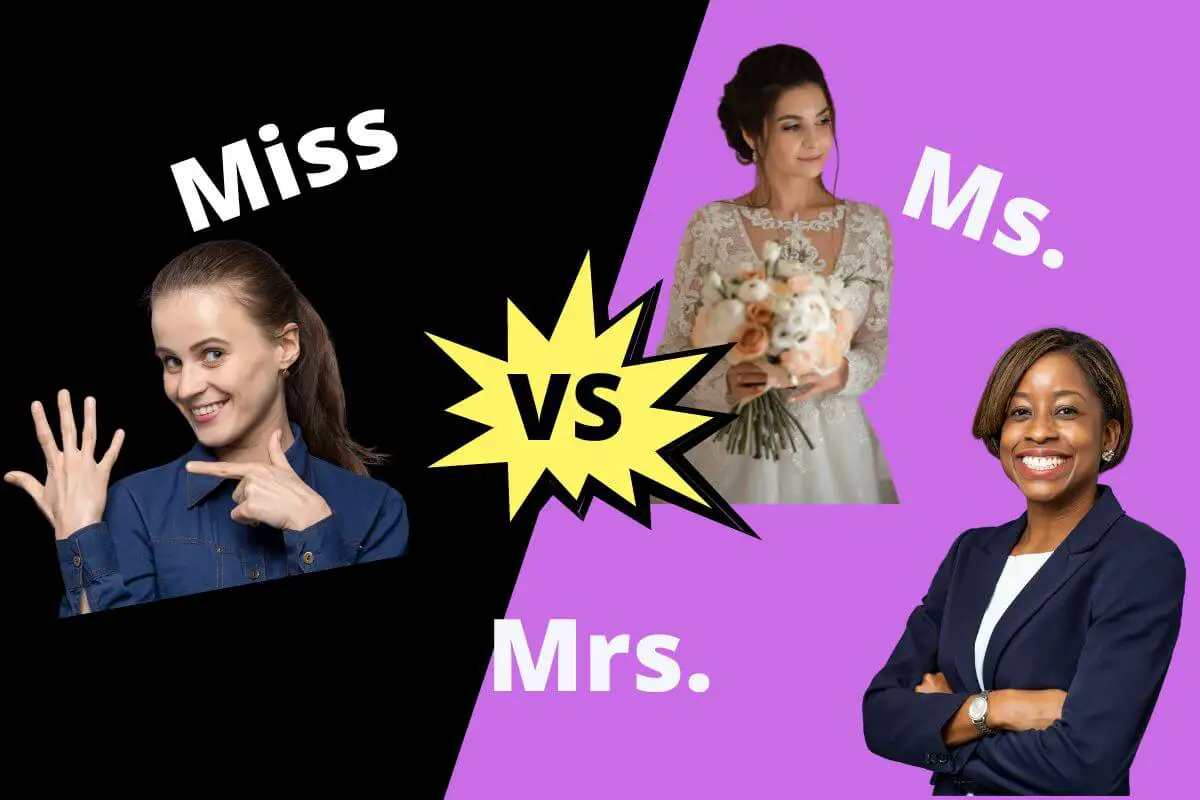The main difference between Miss and Ms is that someone who uses Miss is usually unmarried, whereas Ms. can be used for a married or unmarried woman. Mrs. is only used for a married woman.
Miss, Ms., and Mrs. are the three official titles that women may use. Knowing the differences between the three is essential to utilize these prefixes correctly since using the wrong title for anyone is unfriendly or rude.
Table of Contents
Miss vs. Ms vs. Mrs
| Miss | Ms. | Mrs. | |
| Usage | When addressing young, unmarried women under 18, use the prefix miss. | Ms. is for young unmarried women. Married women are frequently addressed as Ms. in a corporate situation when marital status is unknown or considered necessary. | A married woman is a Mrs. |
| Pronunciation | Rhymes with hiss | To differentiate “Ms.” from “Miss” or “Mrs.,” the predominant pronunciation is “mizz.” | Miss-iz |
| Meaning | Miss is the term for single women. Used generally for girls who are not adults. | Used for working women. It defines any woman who is not essentially married. | Addresses married women. |
Difference Between Miss and Ms
Meaning
A single woman is traditionally addressed as “Miss.” People first used the phrase in the late 1700s to describe an affluent, single lady.
Women involved in the women’s liberation movement during the 1970s believed “Ms.” was an appropriate substitute for “Mr.” whether they were married or single at the time. Today, women who don’t want to identify themselves with their marital status use “Ms.”
Additionally, “Ms.” is helpful when the woman’s marital status is unknown.
History of Mrs.
“Missus” is the colloquial term for “mistress.” Because of this, “Mrs.” has an abbreviation with an “r.”
Mistress referred to a superior in the middle of the eighteenth century as an honorific. The name “Mrs.” was more often used for married women until the term “Miss” emerged in the late 1700s.
You seldom see the term “Missus” printed in the American English language. It’s uncommon in British English as well. But when addressing a married lady, people on both sides of the Atlantic use “Mrs.”

Pronunciation
Miss: Miss is spoken phonetically or precisely as it appears on the page. Miss rhymes with either “hiss” or “his.”
Ms.: To differentiate “Ms.” from “Miss” or “Mrs.,” the predominant pronunciation is “mizz.” However, you’ll hear folks pronouncing it similarly to “Miss” in numerous places.
Mrs.: Based on where you are in the globe, “Mrs.” people may speak it in a few different ways. The common pronunciations can be “miss-iss,” “miz-is,” or “miss-iz.”
Usage
When addressing young, unmarried women under 18, it’s common to use the prefix “Miss.” Technically, you may use Miss to address any unmarried lady. Still, it might come across as childish and immature when used to call older women or divorced women.
Using “Ms.” is almost always the best option if you don’t know how a woman wants to be addressed. Girls under 18 are addressed as “Miss” in formal situations.
History of Ms.
You can address any woman, regardless of her marital status, as Ms. It’s a common phrase that first appeared in the 1950s. It gained popularity during the women’s rights movement in the 1970s.
The use of this term for official papers was eventually permitted in 1972 by the US Federal Printing Office after much discussion. The benefit of using this phrase is clear, and it is more used in professional settings in Britain and North America. It is also favored mainly by single, married, or divorced women.
As per the American Heritage Book of English Usage, “Using Ms. eliminates the need to decide whether to address someone as Mrs. or Miss since Ms. is always appropriate. Ms. is appropriate whether the lady you are addressing is married and whether or not she has changed her name.”
Until a person expresses a different desire, “Ms.” is the customary default title for women in business. This standard is also becoming increasingly widespread socially.
You may use it in any situation to refer to an adult woman who is the female counterpart of Mr. However, Mrs. refers to married women. Miss strongly depends on age. Ms. often refers to young unmarried women.
Married Women
Married women are frequently addressed as “Ms.” in a corporate situation when marital status is not known or considered necessary. It’s not polite to assume someone’s marital status.
Today, many married women are addressed as “Mrs.” Women may choose to adopt their husband’s last name, or they may choose not to change their name.
If a woman is separated, she still may want to be addressed as “Mrs.” This is why it’s important to ask a woman how she wants to be addressed.
Historically, people would use the husband’s first name and last name, along with “Mrs.” This custom is dwindling, though.
Example: Mr. and Mrs. William Smith

Is Ms. Short Form for Miss?
The term “Miss” refers to unmarried ladies and young women in general, especially if they’re under the age of 18. This term is also prevalent in beauty contests like Miss World or Miss Universe. It can be impolite in some settings to address a married woman as “Miss.”
“Ms.” arose to meet the need to include a title for working women that didn’t have to do with their marital status. The word “Mr.” did not denote a man’s marital status, including whether he’s divorced or not. For women’s names, they want a similar convention.
Showing Respect
Although most individuals use titles like “Miss,” “Mrs.” and “Ms.” to show respect, if you don’t use them properly, you run the risk of offending someone. Knowing how each function is always beneficial.
As previously stated, it’s always best to ask a woman how she wants to be addressed to avoid disrespecting her. In professional settings, you should refer to someone by their preferred title when addressing them.
If you’ve found this article helpful, check out our post on the difference between love and in love.

